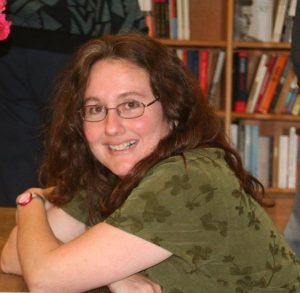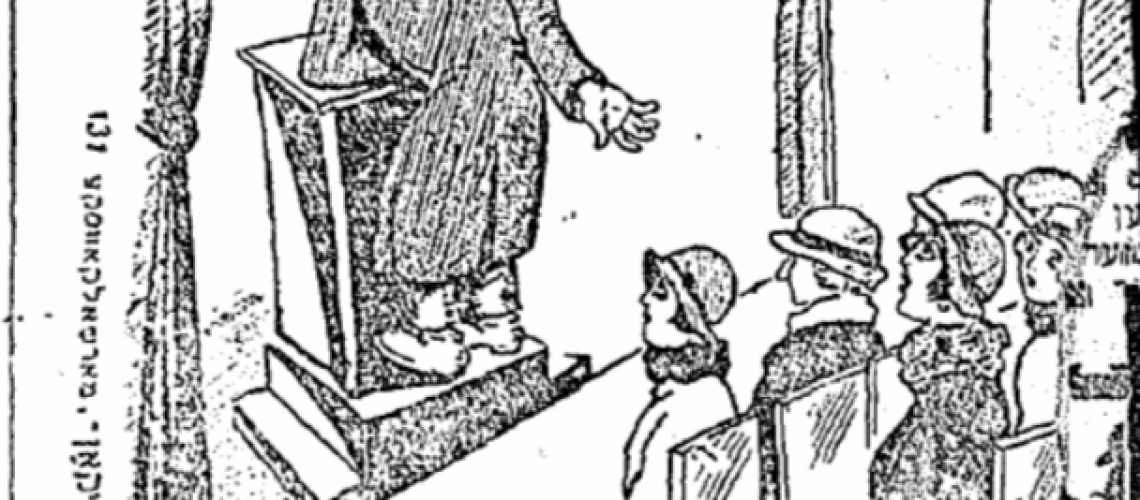The last few blog posts documented the founding conference of Neshei Agudath Israel, the women’s organizing of the Agudah. 1929 saw other women’s conferences, including the Lodz conference for the Bnos Agudath Israel, the youth movement for girls and young women, that was held in May. Bnos at that time had been in existence for three years, but already had a few hundred chapters throughout the country. The conference was hailed as a significant religious and political development in the Orthodox press, but others considered the phenomenon of a conference of religiously observant young women intrinsically ludicrous. A satirical column in Haynt, the Warsaw daily, focused on the issue of male speakers at this conference (which we know did include speeches by male Agudah leaders).
The explanatory brackets are my own. Special thanks to Chaim Sniczer for calling our attention to this column.
The Rascal, by the Happy Pessimist
May 24, 1929
The Conference of the Bnos Agudath Israel in Lodz

As we know, this week the Bnos Agudath Israel convened a national conference in Lodz. At this conference, a member of the Central Committee of the Agudah delivered greetings from the organization. Here is what he said:
“Honorable women!
I will not speak for long, since it says ‘Do not speak excessively with women’ [Pirkei Avot 1: 5].
A woman is a wondrous thing, not to be dismissed with a wave of the hand. The importance of women might be gleaned from the fact that the word “Mitzvah” is grammatically feminine and the word “Aveirah” [transgression] is also feminine and “Oylem hazeh” [this world] is masculine.
Those who say you are fanatical women are lying. At a time when modern women were still going around with their own hair, you were already fashionably dressing à la garcon [NS: lit. like a boy–with shorn hair?]
In the name of the Agudah, I greet you briefly with the brief wish that you might become my footstool [NS: according to Jewish folklore, women who support Torah scholars are privileged to serve as their footstools in the world to come].
We don’t bother with the Zionists, and their Hebrew. We believe in Yiddish. Let them pay respects to the “Lady,” we are going with the “Servant Girl.” [NS: Hebrew was sometimes referred to as the high-born “Lady,” as compared to the simple Yiddish “servant girl.”]
And I have good news for you: The Agudah has manufactured a very long dress, which begins in Lodz and ends in the Central Committee.
I’m done! I beg of you not to start singing, because “a woman’s voice.” [NS: “a women’s voice is nakedness,” i.e. forbidden for men to hear]
After the discussions, the following resolutions were taken up:
- To convene a conference on the best chulent in Poland.
- To work out a compromise with the Agudah wherein [male] Agudah members relinquish their right to vote in kehillah elections in exchange for the female members of the Agudah ceasing to recite the blessing “Who has not made me a woman.” [NS: the Agudah fought strenuously and successfully to keep women from being able to vote or be represented in elections of Jewish community councils. The blessing “who has not made me a woman” is part of the morning blessings recited by men; women ordinarily substitute “Who has made me according to his will”]
- And that Meshulam Kaminer should launch a newspaper called “Di yidene” [NS: Meshulam Kaminer was an Agudah activist, journalist, and from 1925 to 1930 editor of the Orthodox newspaper Der Yid; the term “yidene” is an old-fashioned and often derogatory term for a Jewish woman. For more on Kaminer, see http://yleksikon.blogspot.com/2019/02/meshulem-kaminer.html ]

Naomi Seidman is the Chancellor Jackman Professor of the Arts in the Department for the Study of Religion at the University of Toronto and a 2016 Guggenheim Fellow; her 2019 book, Sarah Schenirer and the Bais Yaakov Movement: A Revolution in the Name of Tradition, explores the history of the movement in the interwar period. Naomi’s book was a finalist in the National Jewish Book Award’s Education and Jewish Identity category and a winner in the Women Studies category.

